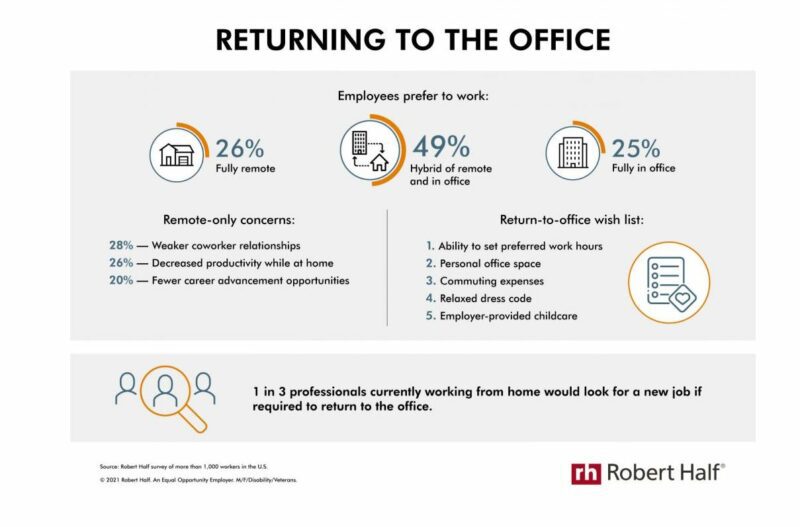Want to retain staff? Don’t force them to return to the office
Unleash Your People Only 25% of US workers want to return to the office full-time.
- UK Chancellor Rishi Sunak’s view that the future of work focuses on the office is being debunked.
- One in three US workers would consider changing jobs if forced to return to the office full time, according to a new survey.
- The future of work will be hybrid and companies need to make sure they listen to their employees’ views on opening up the office.
Research by Robert Half is another nail in the coffin for UK Chancellor Rishi Sunak’s take of the future of work.
In a Daily Telegraph interview at the end of March, Sunak said staff would “vote with their feet” and quit their job if they were not allowed to return to the office once the pandemic eases.
Instead, California-based hiring company Robert Half’s survey of more than 1,000 workers in the US found that one in three professionals would look for a new job if their current employer required them to return to the office full-time.
In fact, only 25% of those surveyed said they would prefer to only work in the office.
[Read more: Face reality, Rishi: The remote working genie is out of the bottle.]
The future of work is hybrid
Just 26% of those surveyed said they wanted to work fully remotely. The study found that 49% would prefer a hybrid working arrangement, dividing their time between the office and another remote location.
A recent Microsoft report also said the future of work would be hybrid, and noted how employers who embrace this would be more successful in attracting and retaining talent.

Robert Half senior executive director Paul McDonald noted: “After a year of drastic change, many business leaders are eager to restore a sense of normalcy and welcome staff back to the office.
“But reopening doors will bring new obstacles for companies to navigate.
“Not all employees will be ready — or willing — to return to the workplace, so staying flexible and responsive to their needs will be critical.”
Transitioning to a hybrid workforce
But what should companies prioritize when embracing hybrid work?
According to Robert Half’s survey, the wish list for those looking to return to the office at least part of the time includes the ability to set preferred work hours, employers paying their commuting costs, and a personal, distraction-free workspace.
McDonald added: “Regardless of timing, companies should take a measured and carefully planned office re-entry approach and keep employees’ health and safety top of mind.
“Leaders should also use the opportunity to solicit staff feedback to shape corporate culture for the future.”
Corporate culture in a hybrid working world is a huge discussion point at the moment. In line with LinkedIn co-founder Reid Hoffman’s warning that remote workers should not become “second class citizens,” Robert Half notes in a blog post that managers need to stay vigilant to monitor potential disengagement across the workforce.
Sign up to the UNLEASH Newsletter
Get the Editor’s picks of the week delivered straight to your inbox!

Chief Reporter
Allie is an award-winning business journalist and can be reached at alexandra@unleash.ai.
